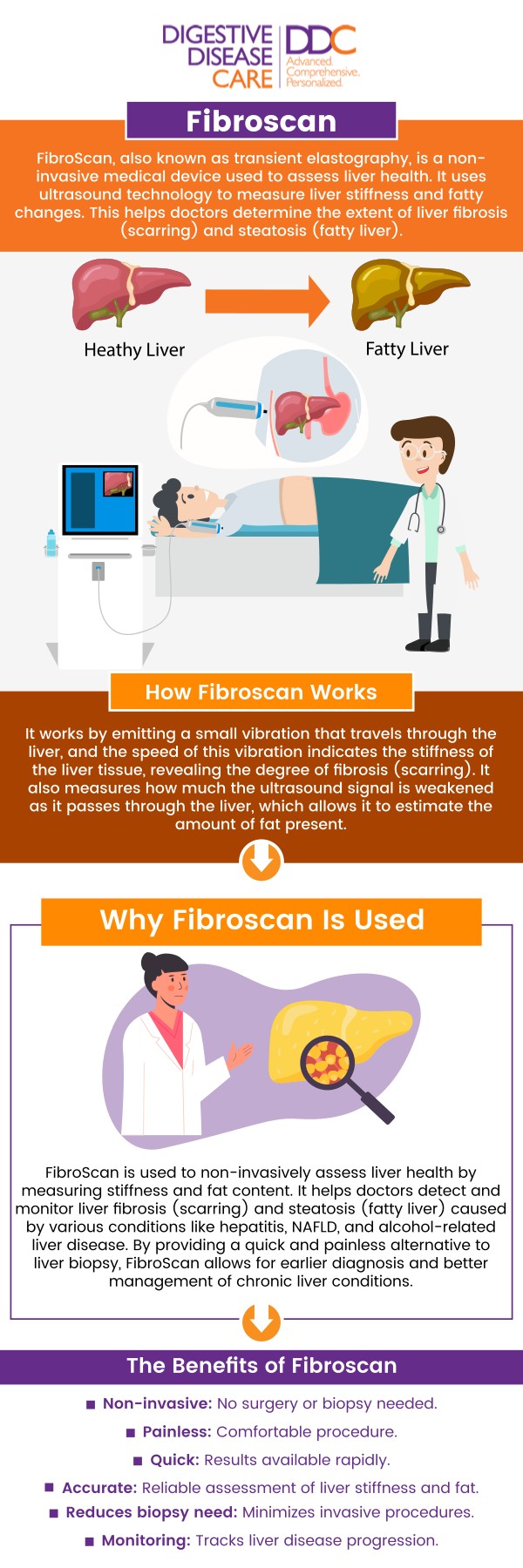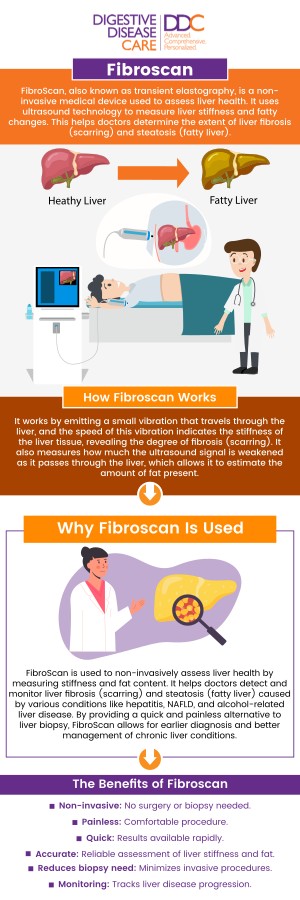FibroScan Procedure Specialist in Forest Hills, NY
At Digestive Disease Care, our team of specialists provides FibroScan procedures to assess liver health with precision. Using advanced, non-invasive FibroScan technology, we effectively detect liver fibrosis and monitor conditions like hepatitis, fatty liver disease, and other liver-related issues. For more information, contact us today or book an appointment online. We are conveniently located at 107-40 Queens Blvd Ground Floor Forest Hills, NY 11375.




Table of Contents:
How often should I have a FibroScan?
Do I need to prepare for a FibroScan?
What can a FibroScan diagnose?
How accurate is FibroScan in assessing liver health?
At Digestive Disease Care, we prioritize comprehensive assessments and personalized treatment plans for our patients. FibroScan is a vital tool in our diagnostic arsenal, offering a non-invasive method to evaluate liver health by measuring liver stiffness and fat content. This examination is crucial for diagnosing and managing liver conditions such as fibrosis and steatosis, common in patients with digestive disorders.
FibroScan is integral to our initial evaluation process for patients suspected of having liver disease. It aids in assessing the severity and stage of liver fibrosis, allowing us to tailor treatment strategies effectively. For patients with established liver conditions, including hepatitis B or C, nonalcoholic fatty liver disease (NAFLD), or alcoholic liver disease, regular FibroScan examinations are essential. These evaluations help us monitor disease progression, enabling timely interventions to manage liver health effectively.
Certain situations require more frequent FibroScan exams, including for high-risk patients with chronic liver diseases who need closer monitoring, and for those undergoing antiviral or anti-fibrotic treatments to assess effectiveness. Liver transplant recipients also benefit from regular FibroScan to evaluate graft function and detect complications early. Guidelines suggest patients with mild to moderate liver fibrosis should have a FibroScan every 6-12 months, those with advanced fibrosis or cirrhosis should be assessed every 3-6 months, and individuals with low liver disease risk but other risk factors should have an annual exam.
The frequency of FibroScan exams is customized based on each patient’s liver disease type, severity, treatment response, and overall health. Patients without a diagnosed liver condition but with risk factors, such as obesity, diabetes, or a family history of liver disease, may still benefit from periodic FibroScans. The timing of exams is adjusted based on individual risk factors and symptoms. Regular check-ups and clear communication with your healthcare provider are essential for maintaining liver health and determining the appropriate exam schedule.
To ensure accurate results for your FibroScan, it’s essential to follow preparation guidelines. Fast for at least two to four hours before the procedure to minimize interference from stomach contents, though water is usually permitted unless otherwise directed by your healthcare provider. Be sure to provide a complete list of your current medications, as our team will review them and advise if any adjustments are necessary to ensure the accuracy of the results.
For your FibroScan appointment, we recommend wearing loose-fitting clothing to allow easy access to the right side of your abdomen. While changing into a gown is typically not required, comfortable attire helps our specialists perform the procedure with ease. If you have metal implants such as pacemakers, defibrillators, or joint replacements, please inform our team.
During your FibroScan, you will lie on your back with your right arm placed above your head. A healthcare professional will apply a water-based gel to your skin and gently place a probe over the liver area. The probe emits sound waves that allow the FibroScan to measure liver stiffness. The procedure is quick, lasting around 10 to 15 minutes, and is painless. You may feel a slight vibration, but it should not cause any discomfort.
After the procedure, you can immediately resume normal activities. Some patients report minor discomfort at the site of the probe, but this usually dissipates within a few hours. Your results will be reviewed by our experts, who will discuss them with you and recommend any necessary follow-up tests or treatments.
FibroScan is pivotal in diagnosing liver fibrosis, which is the scarring of liver tissue often resulting from chronic liver conditions. FibroScan is essential in identifying cirrhosis, an advanced stage of liver fibrosis. Early detection of cirrhosis is crucial for managing complications and improving patient outcomes.
Beyond these applications, FibroScan is instrumental in managing other liver conditions. For patients with chronic hepatitis, it helps us assess inflammation and fibrosis severity, guiding personalized treatment plans. In alcoholic liver disease cases, it evaluates liver damage to determine the disease stage. For autoimmune liver conditions like primary biliary cholangitis (PBC) and primary sclerosing cholangitis (PSC), FibroScan aids in monitoring disease progression and evaluating treatment effectiveness.
Moreover, FibroScan plays a role in liver cancer detection by identifying liver nodules or masses and assessing their stiffness, which can inform the need for further diagnostic tests, such as biopsies.
We prioritize non-invasive, efficient solutions like FibroScan, which provides immediate results. This tool enhances our ability to promptly diagnose and manage liver conditions, ensuring the highest standard of care for our patients.
FibroScan is particularly advantageous for patients as it helps in assessing liver health by sending harmless sound waves through the liver to evaluate liver stiffness, providing crucial information on liver fibrosis and scarring. This non-invasive tool also plays a vital role in guiding treatment plans by accurately assessing the stages of liver fibrosis, enabling us to tailor individualized treatment strategies for conditions.
FibroScan offers precision and efficacy in liver disease management by accurately detecting and staging liver fibrosis and cirrhosis. It plays a crucial role in diagnosing advanced fibrosis (F3 or F4) with high sensitivity and specificity, providing confidence in both diagnosis and subsequent management.
FibroScan is a valuable tool for assessing liver health, but its accuracy can be influenced by several factors. In cases of mild fibrosis or non-alcoholic fatty liver disease (NAFLD), inflammation and fat content may impact liver stiffness readings. Other factors like obesity, ascites, and technical issues can also affect results, emphasizing the need for skilled operators. Additionally, acute liver inflammation may lead to an overestimation of fibrosis severity, which should be considered when interpreting results for accurate diagnosis and treatment planning.
Incorporating FibroScan into our practice allows Digestive Disease Care to offer enhanced liver disease management, ensuring our patients receive the highest standard of care. Contact us today to schedule an appointment and learn how FibroScan can support your liver health. We are conveniently located at 107-40 Queens Blvd Ground Floor Forest Hills, NY 11375. We serve patients from Forest Hills NY, Queens NY, Brooklyn NY, Elmont NY, Floral Park NY, New Hyde NY, and surrounding areas.

Check Out Our 5 Star Reviews


Additional Services You May Like

Additional Services You May Like
- Abdominal Pain
- Acid Reflux
- Barretts Esophagus
- Bloating
- Capsule Endoscopy
- Celiac Disease
- Colon Cancer Screening
- Colonoscopy
- Constipation
- Crohns Disease
- Diarrhea
- Diverticulitis
- Esophageal PH Monitoring
- Fatty Liver
- Fibroscan
- Gallstones
- Gastroenterologist
- Gastric Chest Pain
- Gluten Intolerance
- Hemorrhoid
- Hemorrhoid Banding
- Hepatitis
- Irritable Bowel Syndrome
- Lactose Intolerance
- Pancreatitis
- Polyps
- Rectal Bleeding
- Stomach
- Ulcerative Colitis
- GI Urgent Care





